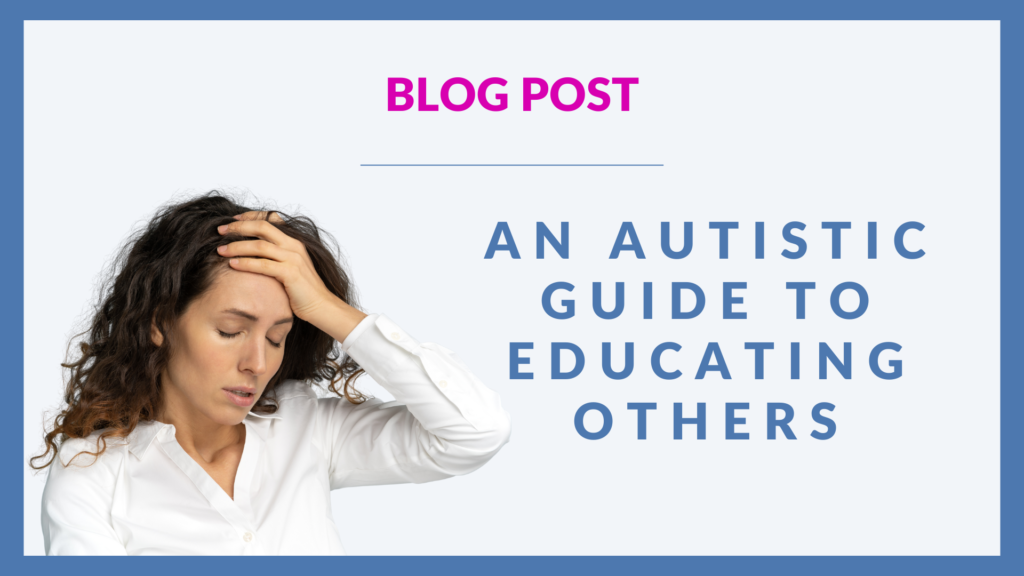An autistic guide to educating others

February 23, 2023 Emma Shergold AN AUTISTIC GUIDE TO EDUCATING OTHERS Updated: April 17, 2025 Introduction This blog was first written in February 2023 when I was still in burnout, unable to work and I feeling extremely angry and frustrated about how I difficult I was finding it trying to navigate the world as a relatively newly diagnosed AuDHD person (autistic with ADHD). When I reviewed this blog in 2025 I thought about rewording it to remove some of that anger and frustration but decided instead to share the reality of what it feels like to be an understood AuDHD person and the unrealistic expectations put on neurodivergent people (and any minority group for that matter) to have to continually explain and justify who they are. Although I have now managed to move past the anger and frustration and focus on creating a life that does work for me, the facts of my original blog remain the same and are experienced by neurodivergent (and other minority groups) on a daily basis. This is still unacceptable and the rest of the world needs to start taking responsibility to educate themselves on these topics – as I mention in the blog itself, complete and accurate ‘formal’ research may not exist because so little has been done, but there is now an abundance of lived experiences and advocates from whom a lot can be learned. An autistic guide to educating others “Where’s your proof?” is unfortunately a comment I am seeing all too often on other people’s posts about their experiences, self diagnoses, and even clinical/formal diagnoses of autism and ADHD, especially in relation to late diagnosed women or people assigned female at birth (AFAB). If the people asking this incredibly invalidating question are after an x-ray to show which part of us is broken, or an MRI that identifies the area of our brain that is diseased, then they are in for a huge disappointment. Why will they be disappointed? Because: We’re not broken We’re not diseased Nobody has deemed us important enough to do (m)any studies on our experiences, so we are having to do our own research and understanding by communicating with others with similar experiences. Then, because some of us are highly empathetic people, and can’t bear the thought of other people going undiagnosed for so long without any support, we are sharing our experiences to highlight what autism and ADHD looks like in middle-aged women. We also share our struggles over the years to raise awareness to other adults who are parents, employers, healthcare providers, or anyone who cares enough about other people to take an interest, so they may recognise if someone they know may be presenting any similar signs of autism and ADHD. For some people, though, this explanation will not (ever) be enough. How it feels to have to keep validating yourself It isn’t exhausting enough to have been told you’re not good enough for 40+ years and to have your thoughts and behaviours questioned. Every. Single. Day. that you hit complete burnout before anyone even starts paying attention, let alone offering any support. Support which then fades away when they’re happy you’re no longer suicidal and can release that from their conscience. It’s not debilitating enough to then have early peri/menopause thrown into the mix and ignored for several years because we’re ‘too young’ (for which, in case you’re wondering, there aren’t any studies (or proof as you may want to call it) on how peri/menopause presents early in neurodivergent women because there aren’t even (m)any studies on middle-aged ND women, let alone peri/menopausal ones!). It’s not enough for us to have all these years of lived experience, combined with years of research (by which I mean communicating with other ND people in the ND community) and possibly a couple of formal diagnoses, if we’re lucky to either live somewhere (ie the UK) where this is accessible after being on a waiting list for 3-4 years (whilst being completely ignored and unsupported during this wait). We are then expected to provide ‘proof’ that we’re not making all this up and somehow attempt to educate others who didn’t believe us in the first place! It is unfair to expect us to keep educating others So, even though I spent more than four decades battling through life, being ostracised by friends, family, work colleagues and society in general, of which two of these years were spent heavily researching my own diagnoses so I could go to my GP and demand an autism and ADHD referral and HRT to even stand a chance of regaining a level with other people who have not had any of these struggles, I am still expected to provide resources and ‘proof’ to help people better understand me. And I’m then accused of not making enough effort to get on with people (this is beyond so much belief that I fear an exclamation mark would deem it sarcasm). I ask you – at which point will you deem me important enough to do your own research and let me know how you can include me in your life? OK, maybe that is a bit unfair. I mean, you have your hair and nails appointment to get to and a big house to tidy ready for the cleaner to come in and clean for you, and a very important career that you’ve managed to sustain and progress, so I’ll give you a few places to start… Some resources to start your educating yourself This is by no means an exhaustive list of resources and advocates, but it’s where I began, which then led me on to many other resources along the way: Sarah Hendrickx video – Girls and Women and Autism: What’s the difference?This is a really insightful video of how girls present differently to boys and, as such, why girls have been overlooked for autism diagnoses until fairly recently. Sarah also provides a staggering statistic about the tiny amount of studies
